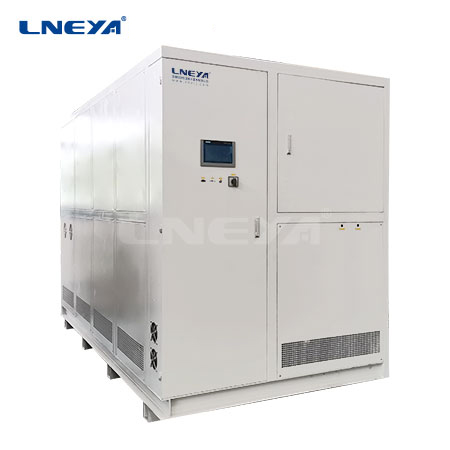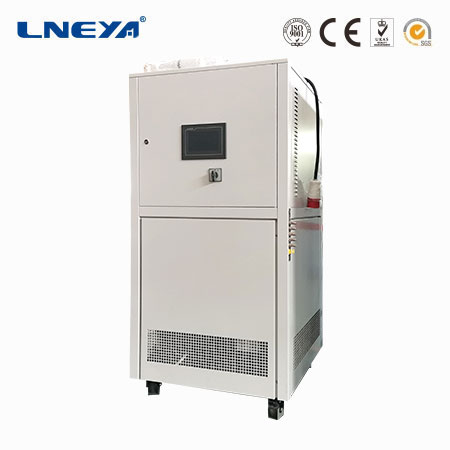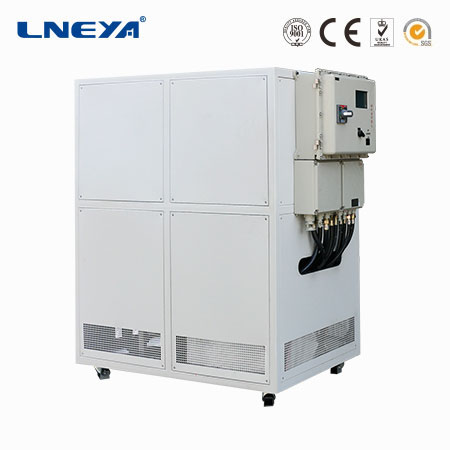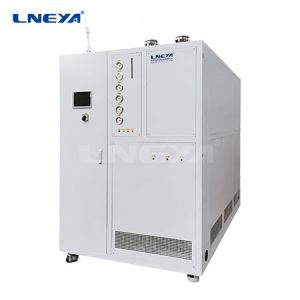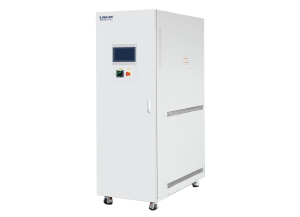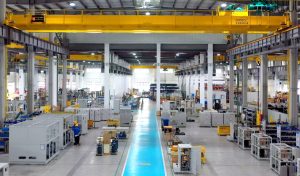Water chiller for high and low temperature testing of aviation fuel
High and low temperature cooling of aviation fuel usually requires the use of water-cooled chillers rather than air-cooled chillers. This is because water-cooled chillers have higher energy efficiency and better temperature control accuracy, and are more suitable for the cooling needs of aviation fuel.
Application of water chillers in high and low temperature testing of aviation fuel:
Low temperature requirements:
- Fuel freezing point test: used to test the freezing point of aviation fuel at low temperatures to ensure that the fuel will not freeze under cold conditions.
- Low temperature performance test: evaluate the performance parameters such as fluidity and viscosity of aviation fuel under low temperature conditions to ensure that the fuel can be transported and burned normally at low temperatures. In cold areas, the fuel may need to be cooled between -40°C and -50°C.
High temperature requirements:
- Thermal stability test: evaluate the thermal stability of aviation fuel under high temperature conditions to ensure that the fuel will not decompose or produce harmful substances under high temperature conditions.
- Volatility test: test the volatility of the fuel at high temperatures to ensure that the fuel will not volatilize excessively under high temperature conditions. In high temperature areas, the fuel may need to be cooled between 30°C and 40°C.
Temperature Cycle Test:
•Thermal Cycle Performance Test: Simulates the cyclic changes of aviation fuel under different temperature conditions to evaluate the performance stability of the fuel under temperature change conditions. It is usually necessary to control the temperature within the range of ±1°C to ±0.5°C to ensure the stability and safety of the fuel during transportation and storage.
Temperature Variation Range:
•Aviation fuel may experience large temperature changes in different seasons and regions, so the cooling system needs to be able to adapt to a wide temperature variation range. The water chiller needs to be able to operate over a wide temperature range, usually covering a range from extremely low temperatures (such as -60°C) to higher temperatures (such as above 40°C). The ability to quickly switch between high and low temperatures to simulate the rapid temperature changes of aviation fuel under different temperature conditions is very important for evaluating the thermal cycle performance of the fuel.
In summary, water-cooled chillers are more suitable for the high and low temperature cooling needs of aviation fuel due to their high energy efficiency, precise temperature control and stability. When selecting a chiller, it is also necessary to consider factors such as specific application scenarios, cooling requirements, available space, and ease of maintenance.
- MORE
LN -60°C~ -10°C
适用范围 Product Features 产品参数 Product Parameter 行业应用 APPLICATION 航空航天材料|试验装置控温解决方案 在航空航天领域,材料的性能直接关系到飞行器的安全、可靠性和…
- MORE
LJ -45°C~ -10°C
Fast cooling and low cooling temperature -5~-150°C Water Cooling LNEYA specializes in the production of single-fluid cryogenic chillers. The refrigeration temperature ranges from -150°C to -5°C, which can mee…
- MORE
LD -80°C~ -30°C
1.Temperature ranges from -5℃ ~ -150℃, can meet different temperature2. Famous brand semi-closed piston compressor, semi-closed bipolar piston compressor, semi-hermetic screw compressor, main brand are BOCK. Bitzer, Cop…
- MORE
SLJ -110℃~-150℃
1.Temperature ranges from -5℃ ~ -150℃, can meet different temperature2. Famous brand semi-closed piston compressor, semi-closed bipolar piston compressor, semi-hermetic screw compressor, main brand are BOCK. Bitzer,…
- MORE
CDLJ -110°C~ -50°C
5kW Chiller; 10kW Chiller; 30kW Chiller; 60kW Chiller; 120kW Chiller Widely used in chemical, pharmaceutical, biochemical and other industries in the field of low temperature reaction, refrigeration speed, safety and reliabil…
loading…
已经是到最后一篇内容了!
Related recommendations
-
KRY 0℃~+100℃ (1to1)
3169Temperature range is 0℃~+100℃, which can be extended to +135℃ according to the actual situation, and the temperature control accuracy is plus or minus 0.5℃. The equipment can control the flow and pressure independently whil...
View details -
Do You Really Need an Industrial Chiller for Your Applications
823Is an industrial chiller really necessary for your applications? Learn when to use a chiller, its benefits, and how to choose the right one for your process.
View details -
Laboratory crystallization water chiller
1308Laboratory crystallization water chiller is a device specially used in laboratory environment to control the temperature conditions during crystallization. This equipment is mainly used in the research and development process of chemistr...
View details -
How a Cooling System Keeps Your Furnace Running Longer
765A proper furnace cooling system protects electrical parts, prevents overheating, and extends equipment life. Learn how water cooled, oil cooled, and air cooled chillers keep industrial furnaces efficient, stable, and safe.
View details
 LNEYA Industrial Chillers Manufacturer Supplier
LNEYA Industrial Chillers Manufacturer Supplier









